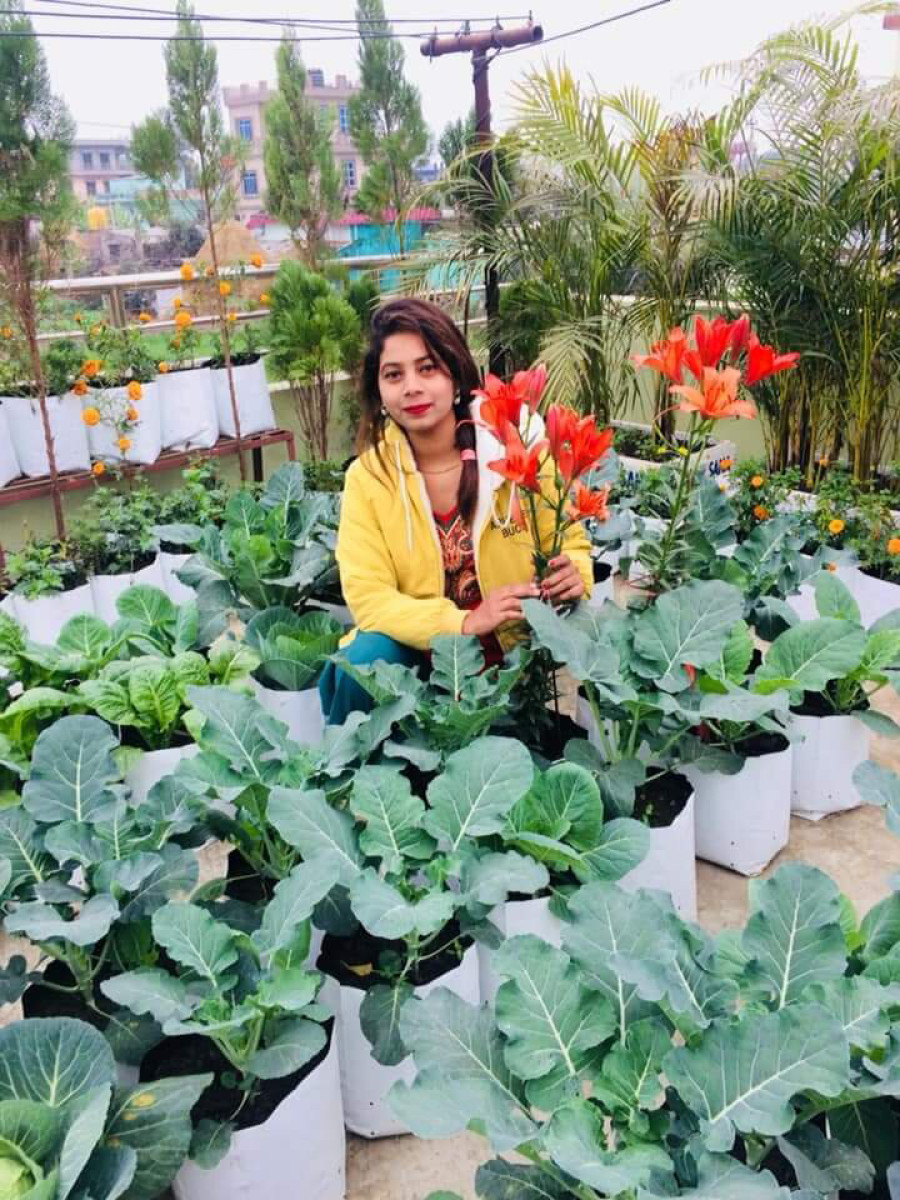Money
Rupandehi housewife grows all her vegetables on her rooftop
The enterprising woman says she doesn't need to buy vegetables and fruits from the market anymore.
Sanju Paudel
Sabitra Bhandari of Tilottama-5, Rupandehi has become a popular figure after her rooftop garden began attracting hordes of curious visitors, eager to find out how she grows succulent vegetables and fruits in crates and plastic bags.
The 29-year-old housewife says she doesn't need to buy vegetables and fruits from the market anymore. She just goes to her rooftop and harvests whatever she wants.
"It has been about three months since my rooftop started to produce vegetables,” Bhandari said. She looks after her plants every day from early in the morning.
The enterprising woman learnt rooftop farming skills by watching YouTube videos during the Covid-19 lockdown when she had so much free time she decided to do make good use of it. Her house occupies 170 square metres.
Bhandari ran a clothing store till mid-March. After she sold the business, she was free. "It became difficult to stay idle without doing anything," she said. "I learned rooftop farming because there was nothing to do."
Rooftop farming may look small scale, but these gardens could prove to be crucial in fighting hunger in urban areas, researchers say. Urban farms also increase vegetation cover—a key way to limit rising temperatures.
Bhandari was attracted to agriculture as she could not go out and do anything for fear of being infected by Covid-19. She said she started vegetable farming after seeing her mother-in-law and relatives doing it in their home in Rupakot-4, Gulmi. It has been five years since she moved to Tilottama in south central Nepal.
She had participated in agricultural training while she was living in her village earlier, and she changed the lockdown into an opportunity. "I started planting some saplings in the garden. Now I am growing more than 150 vegetable and fruit plants."
Bhandari used to watch YouTube for entertainment; but she thought she could learn some skills during the lockdown, so she searched the internet for information.
Her husband works abroad, and she has been raising her two children and paying for her household expenses with the money he sends home. The rooftop venture has allowed her to save Rs3,000 monthly because she doesn't have to buy vegetables anymore. "I had to go to the market twice a week," she said. "Now I am saving all that money."
Bhandari began her rooftop garden by collecting plastic bags, pots and different types of crates from the market in which she planted vegetables, fruits and non-seasonal flowers using soil and organic manure, she said.
She makes fertiliser using the waste from her kitchen. She said that the plants are disease-free because she has been using cow manure as fertiliser. "I have been eating poisonous vegetables sold in the market till now," she said. "Not having to buy vegetables has been a relief."
In a short period of time, she has experienced that roof farming has given positive results. She says even her 10-year-old daughter and nine-year-old son are helping to grow vegetables by watering and taking care of them. Vegetables and fruits can be grown in a small area with the right roof and by following the right process, Bhandari said.
She started roof farming by investing Rs100,000, and said that she planned to develop her garden in an attractive way by spending up to Rs200,000. She said her husband abroad was happy with her hard work when she showed him photos of the vegetables she had grown at home.
Bhandari said she sold the vegetables and fruits from her garden that she could not consume. Since she does not use pesticides, growing vegetables organically has given a good sign.
She has 400 crates and plastic bags on her rooftop. Learning from her, many women of Siddhartha Tol have started turning the roofs and terraces of their houses into vegetable gardens.
Bhandari's daily life has also changed after she started cultivating vegetables on the roof. According to her, green miracles can be created on the roof with the water used in the kitchen.
She said that for those who have houses in the city but do not have land to grow vegetables, roof farming can be a source of income. She added that rooftop farming could be an easy way to produce vegetables for one's own use and to earn extra income for household expenses.
Bhandari said she was still going through her trial period, and that she had dispelled the notion that something can be done only through formal education. "I have passed SLC, and I feel that one can be capable when you do things by yourself," she said.
She feels that people can move forward easily if they have skill training and have a zeal to learn something. Hearing that emphasis should be laid on domestic production, she said that there would be no problem in production if one was willing to do it.
She said that if housewives are trained in rooftop farming at the local level, there would be greenery at home and every family could become self-sufficient.




 9.7°C Kathmandu
9.7°C Kathmandu















